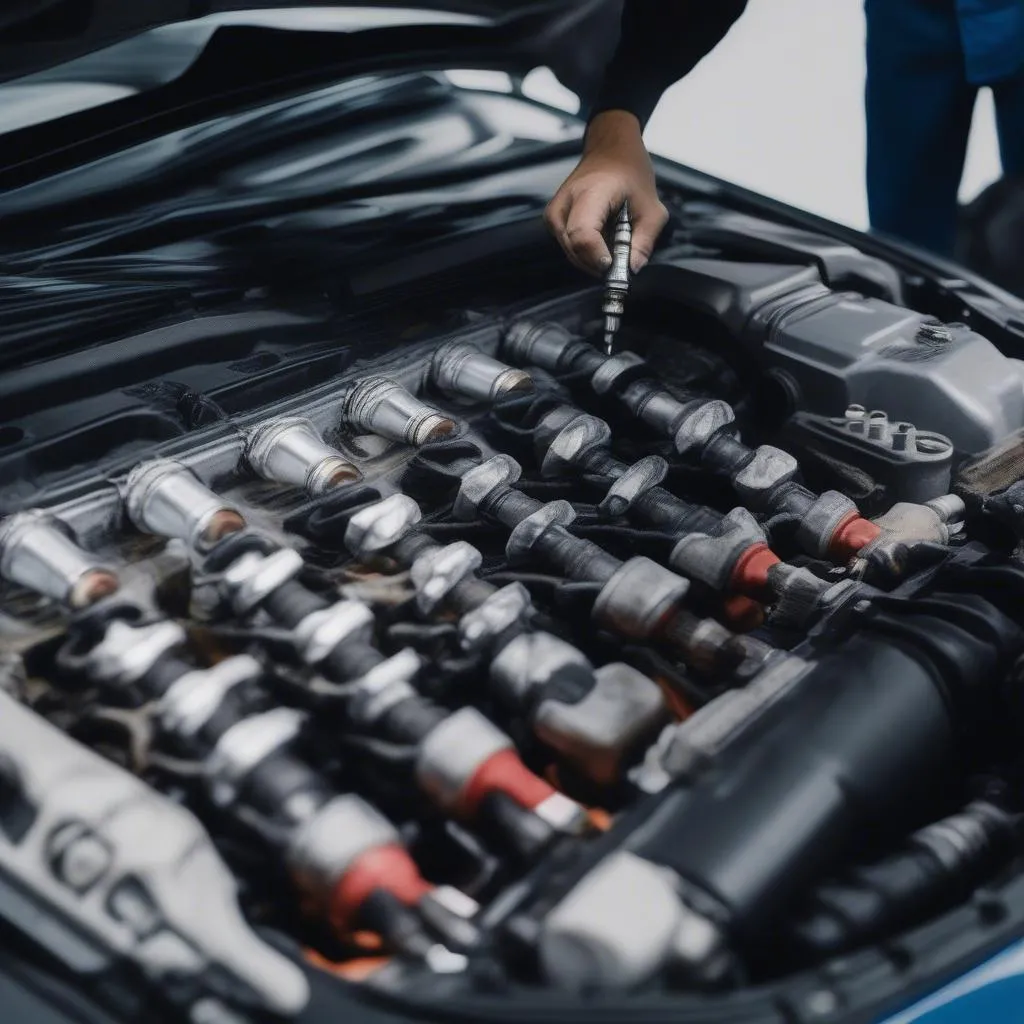BMW Spark Plugs: Your Guide to Ignition Mastery
Let’s face it, your BMW is a masterpiece of engineering. It demands the best, and when it comes to spark plugs, you don’t want to settle for anything less than peak performance. But with so many options out there, how do you choose the right Bmw Spark Plugs? This comprehensive guide will walk you through everything you need to know, from understanding their role to finding the perfect match for your engine.
Why Spark Plugs Matter in Your BMW: A Journey into Ignition
You may think of a spark plug as a small, unassuming component, but it plays a critical role in your BMW’s performance. Think of it as the “fire starter” of your engine – the element that ignites the fuel-air mixture, creating the power that propels your car forward.
Imagine driving down a scenic road in the Bavarian Alps. The scenery is breathtaking, the air is crisp, and your BMW is purring like a satisfied cat. Suddenly, you notice a slight hesitation, a loss of power. You pull over, check the engine, and find a cracked spark plug. The journey that promised a smooth, powerful ride has been interrupted.
This is why understanding BMW spark plugs is essential. They’re not just replaceable parts; they’re vital to your driving experience.
What You Need to Know About BMW Spark Plugs: From Basics to Performance
The Importance of Spark Plugs in a BMW’s Combustion Cycle: An Insight
BMW spark plugs are designed to withstand the high pressures and temperatures within your engine’s combustion chamber. They are crucial for efficient combustion, which directly affects your engine’s performance, fuel economy, and emissions.
Spark Plug Components: Dissecting the Igniter
- Electrode: The heart of the spark plug, where the electrical current jumps across the gap to ignite the fuel-air mixture.
- Insulator: A ceramic material that prevents the electrical current from shorting out to the engine block.
- Shell: The metal housing that protects the internal components.
- Gasket: A seal that prevents leaks and ensures a proper connection between the spark plug and the cylinder head.
Recognizing the Right Spark Plug: Factors to Consider
Finding the Right Spark Plug: Understanding the Codes
- Manufacturer: Look for trusted brands like NGK, Bosch, Denso, or Champion. These are known for their quality and reliability.
- Heat Range: This rating indicates the spark plug’s ability to dissipate heat. A higher heat range means the plug can handle more heat.
- Thread Size: The diameter of the spark plug’s threads, which must match your engine.
- Reach: The length of the spark plug, which also needs to be correct for your engine.
- Material: Spark plugs can be made of various materials, including copper, nickel, and platinum. Platinum and iridium plugs offer longer life spans.
Spark Plug Life Span: When to Replace Your BMW’s Ignition Powerhouse
Spark plugs don’t last forever. Over time, the electrodes wear down, affecting ignition and performance. Typically, BMW spark plugs should be replaced every 30,000 to 100,000 miles, depending on the type of plug and your driving habits. However, consult your owner’s manual for specific recommendations.
Choosing the Right Spark Plugs for Your BMW: A Tailored Solution
Choosing the Right Spark Plug: Understanding the Codes
The Power of the Dealer Scanner for European Cars: Your Gateway to Accurate Diagnosis
The Dealer Scanner for European Cars is an invaluable tool for diagnosing spark plug issues and identifying the specific spark plugs needed for your BMW. This advanced tool can access the vehicle’s computer system to retrieve data, providing you with accurate information about the proper spark plug specifications, as well as any error codes related to the ignition system.
Example:
Let’s say you own a 2015 BMW 328i. You want to know the right spark plugs for your model. The Dealer Scanner can access the vehicle’s computer system and provide you with the specific specifications:
- Heat Range: 7
- Thread Size: 14mm
- Reach: 19mm
- Material: Platinum
Understanding the Role of Your BMW’s Model and Engine Size: A Match Made in Automotive Heaven
The specific spark plugs you need will depend on your BMW model and engine size. For instance, a BMW 3 Series will require different spark plugs than a BMW 5 Series.
Example:
- BMW 330i: Uses a specific type of spark plug designed for a 2.0 liter 4-cylinder engine.
- BMW 528i: Features a different spark plug compatible with its 2.0 liter 4-cylinder engine.
By using a combination of the Dealer Scanner, the owner’s manual, and your understanding of your BMW’s engine specifications, you can confidently select the right spark plugs for your vehicle.
Maintaining Your BMW’s Ignition: From Preventative Care to Troubleshooting
Preventative Care for Spark Plug Longevity:
- Regular Maintenance: Scheduled inspections and routine maintenance, such as oil changes, help prevent issues that can damage the spark plugs.
- Fuel Quality: Using high-quality fuel minimizes the risk of deposits forming on the spark plug electrodes.
- Driving Habits: Aggressive driving can cause excessive wear on the spark plugs.
Identifying Spark Plug Problems: The Signs and Symptoms:
- Engine Misfire: A rough idle, stumbling acceleration, or a loss of power.
- Engine Light: A check engine light that illuminates may indicate a spark plug issue.
- Fuel Economy Decline: You may notice a decrease in your gas mileage.
Addressing Spark Plug Issues: A Guide to Troubleshooting and Repair
If you suspect spark plug issues, a qualified mechanic should inspect your car. They can diagnose the problem and replace or repair the spark plugs as needed.
The Importance of Using Genuine BMW Spark Plugs: The Difference is in the Details
Choosing the Right Spark Plugs: Understanding the Codes
- Genuine BMW Spark Plugs: Designed specifically for your BMW, ensuring optimal performance and longevity.
- OEM Spark Plugs: Original Equipment Manufacturer spark plugs produced by the same companies that supply parts to BMW. They are often a good alternative to genuine BMW spark plugs.
- Aftermarket Spark Plugs: Offered by various manufacturers, but they may not meet the same standards as genuine or OEM spark plugs.
The Value of Choosing Genuine BMW Spark Plugs:
- Performance: Engineered for your BMW’s specific engine, maximizing its potential.
- Reliability: Built to withstand the demanding conditions of your BMW’s engine.
- Longevity: Designed for long service life, saving you money on replacements.
Example:
Let’s say you’re driving a BMW M340i. Choosing genuine BMW spark plugs specifically designed for this model will ensure optimal performance and reliability, delivering the thrilling driving experience that the M340i is known for.
Spark Plugs and the Dealer Scanner: Unlocking Your BMW’s Performance
The Dealer Scanner: Your Diagnostic Ally
The Dealer Scanner for European Cars is more than just a tool – it’s a key that unlocks a world of information about your BMW. It can help diagnose issues, identify the right parts, and ensure your car runs smoothly.
Example:
Let’s imagine you’re experiencing engine misfires in your BMW 335i. You want to know if it’s a spark plug issue. The Dealer Scanner can pull error codes from the vehicle’s computer system and point you directly to the culprit.
Key Benefits of the Dealer Scanner:
- Accurate Diagnosis: Pinpoints the exact problem, saving time and money on unnecessary repairs.
- Technical Information: Provides access to a wealth of information about your BMW’s systems and components.
- Time-Saving: Helps you quickly and easily diagnose issues, minimizing downtime.
The Dealer Scanner: Your Partner in Performance
The Dealer Scanner is an invaluable tool for any BMW owner. It’s an investment in your car’s performance, reliability, and long-term health. It empowers you to understand your vehicle better, make informed decisions about repairs, and ensure a smooth and enjoyable driving experience.
Shortcode 1:
 BMW Spark Plugs and Ignition System
BMW Spark Plugs and Ignition System
Shortcode 2:
 BMW Dealer Scanner and Diagnostics
BMW Dealer Scanner and Diagnostics
Shortcode 3:
 BMW Spark Plug Replacement
BMW Spark Plug Replacement
Frequently Asked Questions About BMW Spark Plugs: Your Answers Await
- Q: How often should I replace my BMW spark plugs?
A: Typically, BMW spark plugs should be replaced every 30,000 to 100,000 miles, depending on the type of plug and your driving habits. Refer to your owner’s manual for specific recommendations.
- Q: What are the symptoms of a bad spark plug?
A: Symptoms include engine misfires, rough idle, stumbling acceleration, loss of power, and a check engine light.
- Q: Can I replace spark plugs myself?
A: While some DIYers may attempt this, it’s recommended to have a qualified mechanic replace your spark plugs. This ensures proper installation and prevents potential damage to your engine.
- Q: What is the difference between genuine BMW spark plugs and aftermarket spark plugs?
A: Genuine BMW spark plugs are designed specifically for your BMW and meet the highest quality standards. Aftermarket spark plugs may vary in quality and performance.
- Q: How do I find the right spark plugs for my BMW?
A: Consult your owner’s manual, use the Dealer Scanner for European Cars, or contact a qualified mechanic for assistance.
Discover More About Maintaining Your BMW’s Performance: Explore Our Resources
For further insights and guidance on your BMW’s maintenance and repairs, explore these related articles on our website:
- Spark Plugs for BMW
- 2008 BMW 335i Spark Plugs
- BMW 330i Spark Plugs
- BMW 528i Spark Plugs
- BMW M340i Spark Plugs
Ready to Unlock Your BMW’s Performance? Contact Us Today!
We understand that keeping your BMW running at its peak is essential. Our team of experts is here to assist you with any diagnostics, repair, or maintenance needs.
Connect with us via WhatsApp at +84767531508. We’re available 24/7 to help you keep your BMW performing at its best.
Don’t forget to share your thoughts and experiences with us in the comments below! We’re always eager to hear from our fellow BMW enthusiasts.
